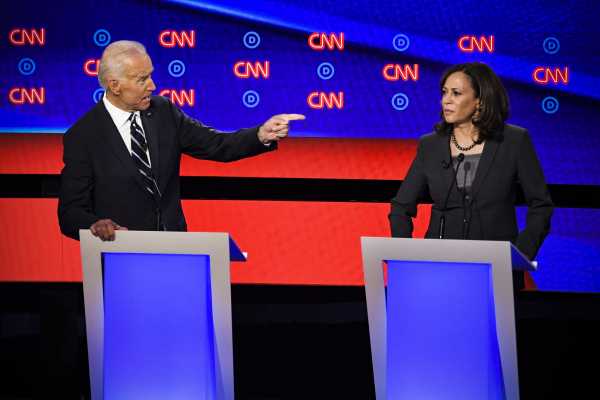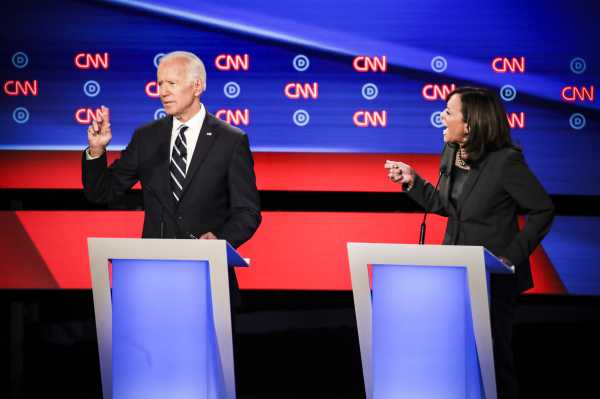
The Joe Biden-Kamala Harris showdown at the second Democratic debate started on, what else, health care.
It’s a top issue for Democratic voters and has featured heavily in every primary debate so far. Biden has positioned himself as the moderate, proposing a plan that would allow Americans to buy into a government insurance plan, but would otherwise maintain much of the health care system that currently exists.
Harris introduced, in the days leading up to the second debate, her own version of Medicare-for-all, the cause célèbre of the left. Her iteration of the bill would move every American into a single-payer system over 10 years (instead of the four-year transition proposed by Sen. Bernie Sanders) and would allow a heavily regulated private insurance market to compete with the government plan, also in contrast to Sanders’s bill that would effectively outlaw all private coverage.
This is not an issue where either candidate is entirely comfortable. Harris has struggled throughout the campaign to give clear answers on key questions, like whether private plans should be permitted under Medicare-for-all, and her campaign’s new proposal seemed to be designed to settle those doubts once and for all. Biden, on the other hand, appeared to casually mix up copays with deductibles in one of his debate answers.

The differences between these two candidates’ approach led to an often-confusing 30-minute health care parley opening the second night of the second Democratic debate. Other candidates were roped into the conversation, but it was really a clash between Biden and Harris, by far the two highest polling candidates onstage and two candidates on opposite sides of the party’s health care divide.
I’m not sure anything was cleared up by the time that dialogue was over, but let’s try to make some sense of it anyway.
Kamala Harris: I listened to people and came up with this plan
CNN’s Dana Bash started by asking Harris about the Biden team’s critique of her health care policy: namely, that she’s been equivocating through the primary on her position.
Harris responded by arguing she has come to her current stance by taking into account the ideas of voters and experts; she used variants of “listen” a half-dozen times in half a minute:
This was clarifying. Health care has been a problem area for Harris throughout the campaign. She co-sponsored Sanders’s Medicare-for-all bill and has at times defended it strongly, including its provision to effectively ban private insurance, only for her campaign to walk those defenses back the next day. She has seemed caught between wanting to support Medicare-for-all and navigating some of the tricky political terrain it presents.
Her new spin on Medicare-for-all seems designed to quell two potential complaints: mass disruption in moving everybody to a single government plan and the elimination of private insurance. Harris’s proposal would take 10 years to transition Americans to the government-run option (instead of Sanders’s four) and would permit private insurers, with significant limitations, to compete with the public plan.
In her listening tour, Harris seemed to have found a version of Medicare-for-all she was comfortable with. But the debate was just getting started.
Biden: Medicare-for-all is going to cost a lot of money and take away people’s insurance
The former vice president started his attack on Medicare-for-all with one of its other big political vulnerabilities: cost. He also accused Harris of “double talk,” apparently for not emphasizing that under her proposal, employer-sponsored insurance would come to an end.
He appeared to claim a few times that Harris’s plan would cost $3 trillion over 10 years, but then later said $30 trillion. The latter figure would make more sense: that is what Sanders’s version of Medicare-for-all is generally expected to cost over the same period. Or he meant $3 trillion per year.
Harris’s plan would probably cost less, at least for that first decade, because not every American would join the plan until the 10th year. (After the first 10 years, however, the gap in spending between the Sanders and Harris plans would shrink; the slower transition is the main difference in cost between the two.)
Harris’s responded by saying Biden was “inaccurate.” It wasn’t clear what exactly she was referring to. She noted that newborns would be automatically enrolled in Medicare under her plan and people could immediately join the government plan if they choose to; they do not have to wait 10 years.
She then tried to turn the tables, saying Biden’s own proposal would leave 10 million people without health insurance. (It might not leave 10 million without insurance, but it certainly would not cover all Americans. We’ll come back to this.)
“So I think that you should really think about what you’re saying, but be reflective and understand that the people of America want access to health care and do not want cost to be their barrier to getting it,” Harris said.
Biden parried with the $3 trillion figure again and then four other attacks:
- Harris’s Medicare-for-all plan would take 10 years to implement, longer than even a two-term president would serve. (This is true.)
- Middle-class taxes would increase. (Harris has actually designed her plan to avoid raising taxes on families making less than $100,000, at least for the first 10 years while the program is being set up. The financing after that, however, is unclear.)
- It would eliminate employer-sponsored insurance. (True.)
- What happens in the meantime? (This is confusing. The transition period allows people to join the new government plan but doesn’t prohibit private coverage in that period. Which means that for many people, their insurance might stay the same in the meantime.)
Harris retorted that “the cost of doing nothing is far too expensive” and noted health care costs are projected, under the current system, to increase to $6 trillion a year 10 years from now. But by that time, the debate was starting to spiral a bit out of control.
Biden: My plan would cost less and still cover a lot of people
Biden, in keeping with his general strategy of invoking Barack Obama as often as possible, billed his plan as the best way to build on the progress of the Affordable Care Act.
This was a big part of Biden’s pitch: My plan is a lot cheaper than Medicare-for-all. The discussion got a little disjointed from there. Harris, countering Biden’s Obamacare namecheck, brought up the fact that former Obama Health and Human Services secretary Kathleen Sebelius had endorsed her plan.
She then continued to attack private insurance under the status quo, noting that deductibles for private health plans (including those sold through the ACA) have hit $5,000 or more.
“My plan makes a limit of co-pay to be $1,000,” Biden replied. (But he surely meant a deductible, which is the amount patients have to pay out of pocket before their benefits kick in; co-pays are the share that the patient has to pay for an individual procedure or service.) He repeated that Democrats should not eliminate employer-sponsored insurance if people want to keep it.
After a detour with Sen. Cory Booker (who lamented the bickering among Democrats when Republicans are trying to scale back health coverage) and Rep. Tulsi Gabbard (who decided to blast Harris for getting Sebelius’s support), Harris attacked Biden again because his plan would not cover every American.
“The plan does cover everyone,” Biden said. But it doesn’t.
His proposal would cover a lot of people, including the poor people in states that have refused to expand Medicaid under Obamacare. But it is still an optional program that lacks the automatic enrollment that Medicare-for-all utilizes to cover literally every single person. Biden’s own website says 97 percent of Americans (not 100) would be covered.
Harris: Don’t adopt Republican talking points about employer-sponsored insurance
Believe it or not, the conversation was not done. Sen. Michael Bennet (D-CO), an avowed moderate, dinged Medicare-for-all for eliminating employer-sponsored insurance, which covers about half of Americans. The moderators came back to Harris to ask if that was true (it is) and she gave a somewhat indirect answer, deploying the same line that Sanders had used the night before about moderators and other Democrats using conservative rhetoric to attack Medicare-for-all, before acknowledging, yes, company plans would be history.
Employer-sponsored insurance is a tricky problem. It is the bedrock of the American system, covering 160 million people, and therefore messing with it could prove politically risky. Polling does show that support for a national health insurance plan drops if people are told it would eliminate private insurance.
At the same time, however, costs for employer-based coverage have steadily risen in recent years, a point Harris didn’t quite make but bolsters her argument that workers are not necessarily overly enamored with their current offerings.
The debate ended on a very confusing note
Things deteriorated quickly before the conversation turned to immigration. Biden, following comments from New York Mayor Bill de Blasio about rising deductibles, repeated that many people could get insurance for free under his plan and deductibles (he got it right this time) would be capped at $1,000. He then laid into Medicare-for-all for giving the appearance of free health care when, in fact, the costs would be paid through taxes.
What I think Biden means is: Sure, under Medicare-for-all, there are no deductibles or copays but you’re going to pay higher taxes to cover the cost of those generous benefits. The question becomes, of course, who feels the brunt of those taxes. Medicare-for-all supporters believe lower-income and middle-class families would see a net benefit at the end of the day, with insurance premiums and out-of-pocket costs eliminated.
But it is true that taxes would have to be increased to cover the costs of Medicare-for-all. This is, in a way, the fundamental tradeoff of single-payer health care. A RAND study of a single-payer program in New York state indicated the increase in taxes would be offset by the elimination of premiums and out-of-pocket costs would shrink dramatically. But right now, we just don’t have a definitive analysis to show how it would shake out at the national level.
Harris struck back by arguing Biden wasn’t doing anything to hold pharmaceutical or insurance companies accountable for their abuses, at a time when Americans with diabetes can’t afford their insulin. Biden responded that he wanted to put insurance executives in jail over the opioid crisis but left pharmaceutical executives out of it.
It was an appropriately bewildering ending to the health care portion of the debate. Many words were exchanged, blows were landed, but it’s not clear anybody came out of it with an advantage.
The core disagreement between the two leading candidates on the stage remained the same from beginning to end: Harris wants to fundamentally overhaul the system to cover everyone, and Biden wants to build on the system we have to cover many more, but not all, Americans.
Sourse: vox.com






